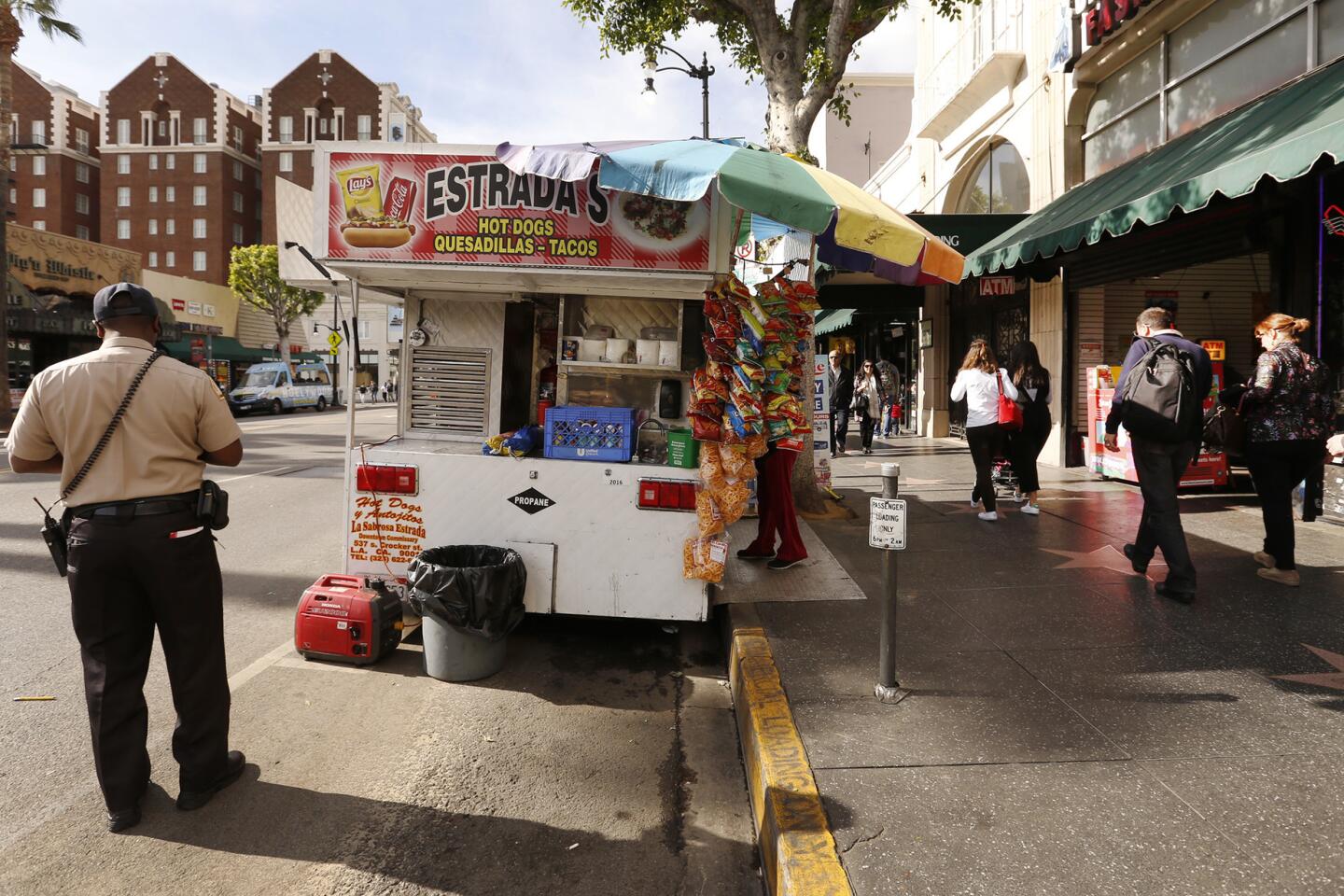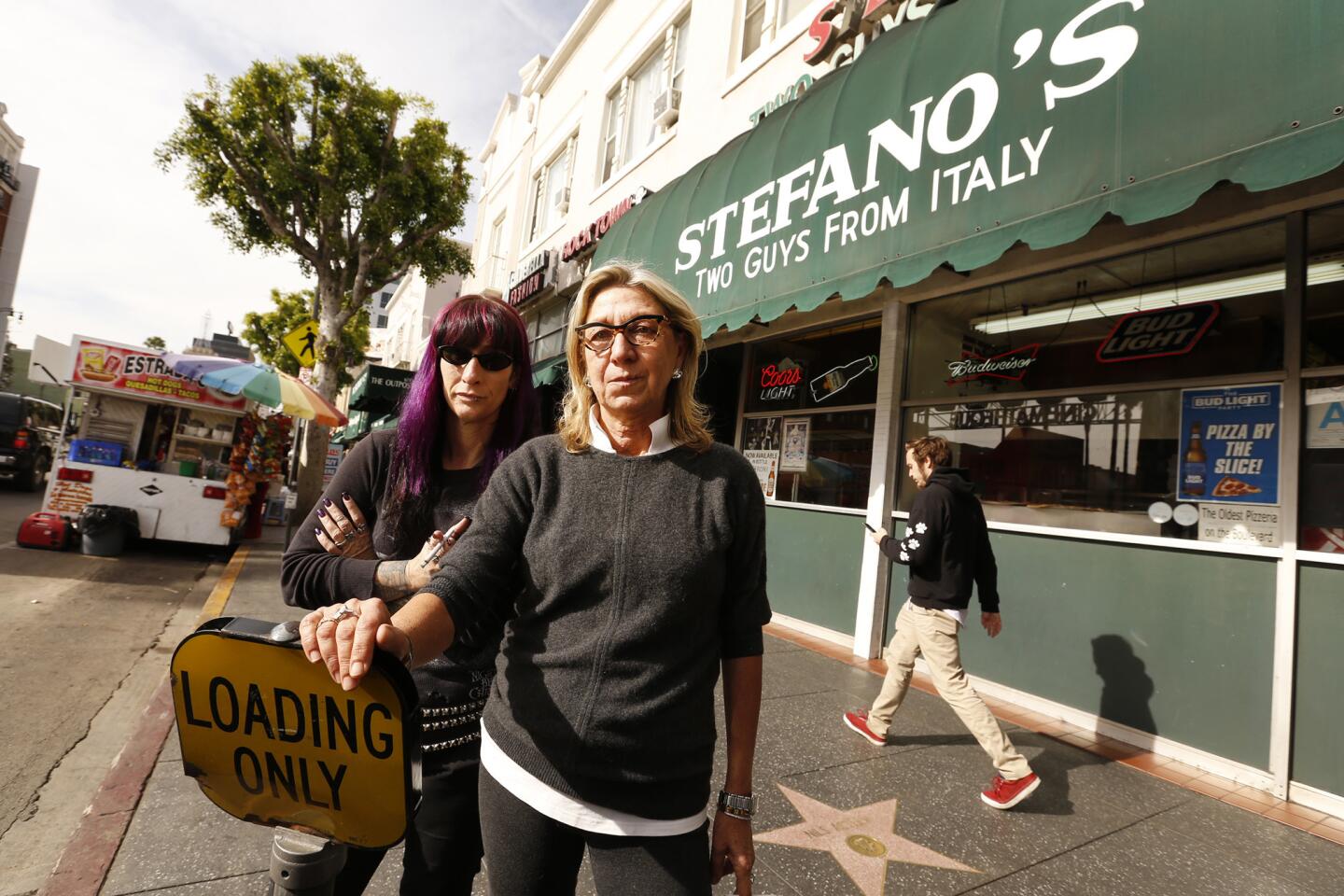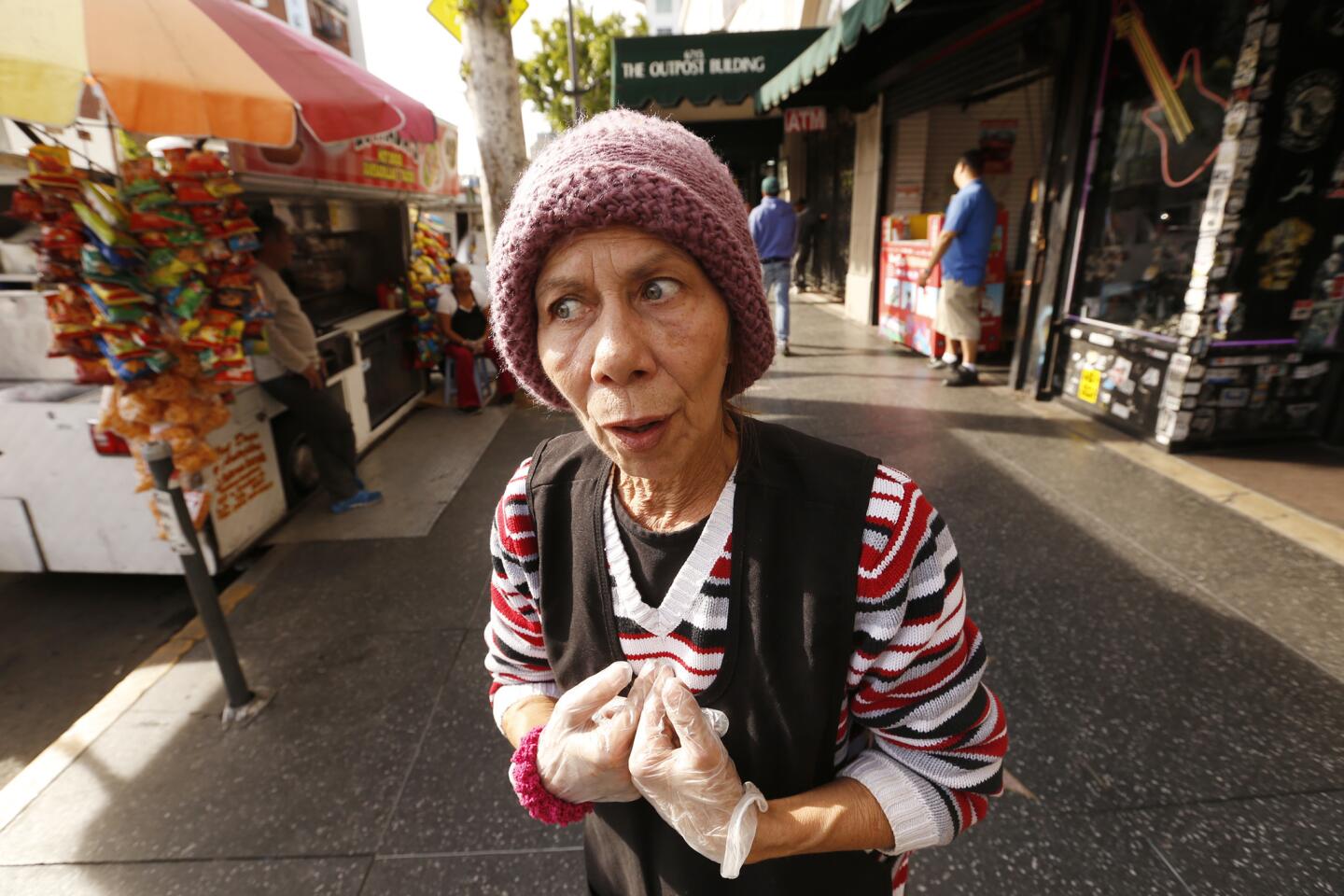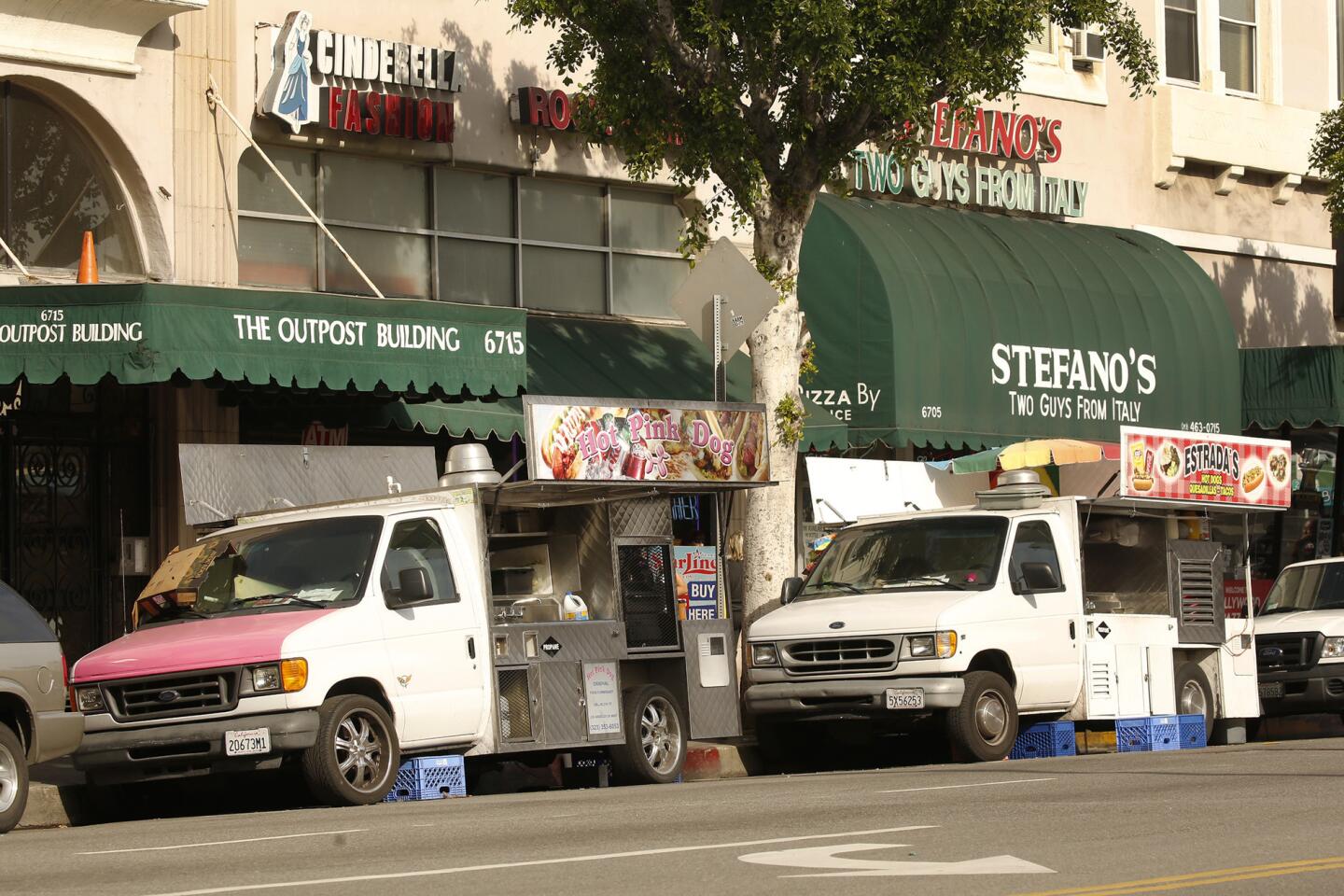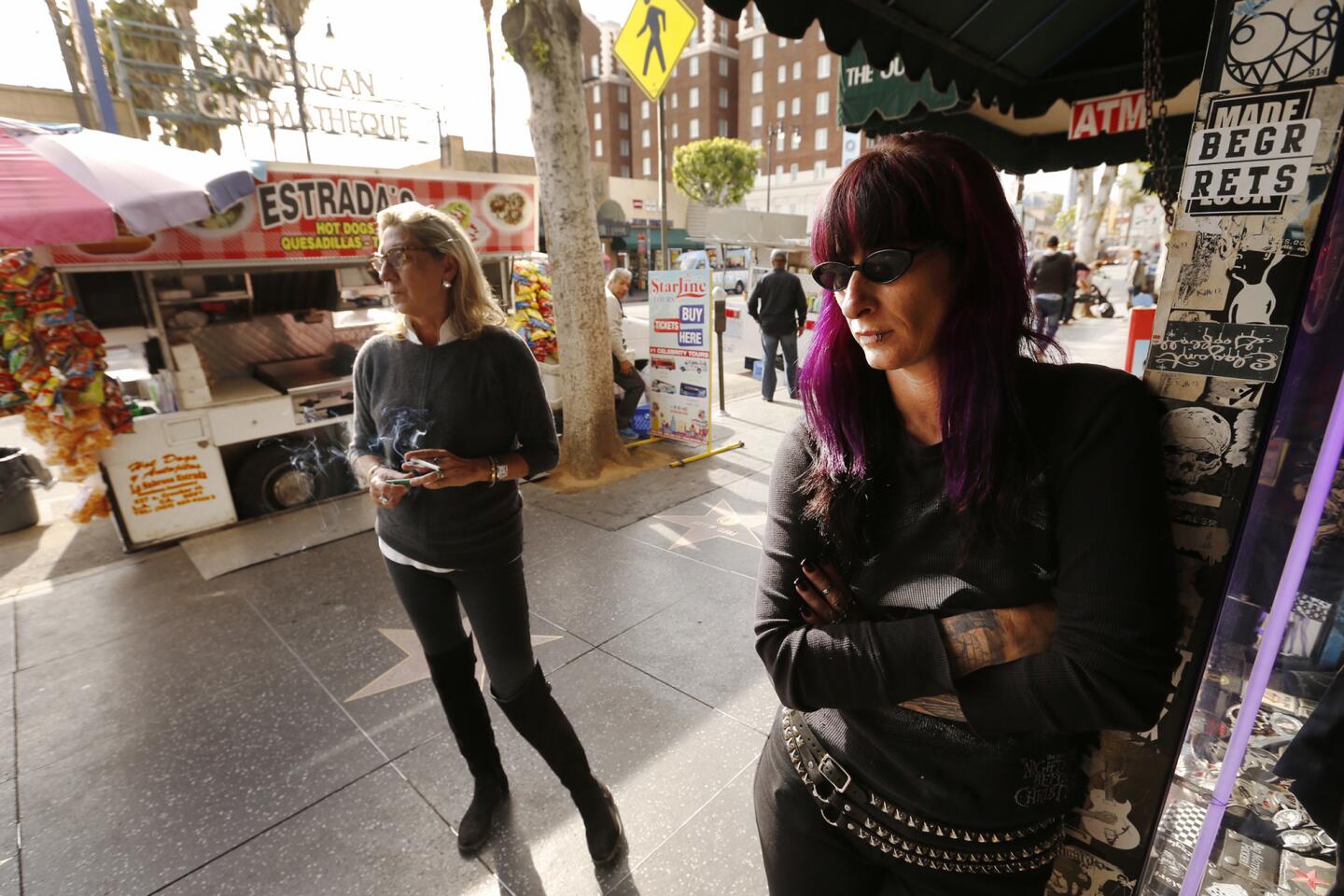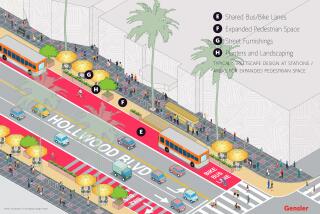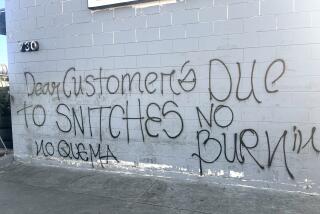Shop owners on Hollywood Boulevard battle to take back the curb from mobile vendors
Even though Hollywood Boulevard is bustling and full of tourists eager to shop, take photos and eat, the pizza shop Stefano’s Two Guys From Italy is empty, its red leather booths vacant. Stefania Alberti, owner of Stefano’s, steps away from the counter. It’s been like this for months, she says, after the hot dog vans began selling food right outside her front door.
“I sell pizza by the slice; they have hot dogs,” Alberti says. Tourists “stop there before they come here.”
Since early September, a quiet battle has been brewing between storekeepers and street hot dog vendors all eager to nab a piece of the lucrative tourist trade along a stretch of Hollywood Boulevard between North McCadden Place and North Las Palmas Avenue.
A hodgepodge of issues concerning transportation and health codes, law enforcement and cultural and language barriers has stymied a resolution. The dispute is part of a long history in Los Angeles of fractious relations between shop owners and mobile vendors, including sidewalk peddling, which is currently illegal.
This battle is significant because it’s happened on one of Los Angeles’ most storied streets, which has seen a major revitalization in recent years with a slew of new upscale development. The boom is bringing more tourists and visitors back to the boulevard, and that has the street vendors and regular merchants fighting for business.
Many of the businesses on the block — the punk store Hot Rock next door, the food market on the corner and others — say the vendors selling hot dogs, snacks and drinks are direct competition, and they are seeing the impact on their bottom line.
“We called the city, we called parking enforcement. We’ve been complaining and complaining, and nothing happens,” Alberti said. “They park there all the time, they stay overnight. They’re covering their [health inspection] grades. It’s killing our business, as slow as it is. They shouldn’t be in front of our restaurant.”
Kelly Kight, who manages Hot Rock and the clothing store Rock Town, also on the block, began taking pictures of the street vendors in September to gather evidence for city officials.
Kight recently started a petition that proposes two solutions: making Hollywood Boulevard a no-food-truck zone from 10 a.m. to 11 p.m., and reenacting a law that prohibits food vendors from operating in front of businesses. The petition has more than 50 signatures from local shop owners and workers.
She said the food vendors exploit Los Angeles Department of Transportation regulations by parking in the same spot every day and paying parking fines instead of moving.
According to Kight and Alberti, one street vendor, La Sabrosa Estrada, in front of their stores hides its health rating, leaves food sitting out and does not have proper refrigeration.
A woman working at the Estrada van declined to comment.
Rosa Bustamante, who works at a neighboring food vendor, said she’s never had a discussion with the shop owners and only recently learned there was an issue over her location.
“They don’t want to understand us,” Bustamante said. “We have a right to sell here, we have to pay taxes to the city each year for the business.
“We’re here for the same reasons. I have to take care of my family.”
According to Bustamante, her boss — who owns two food vans — pays taxes and parking violations totaling $24,000 a year.
“[The shop owners] call the parking enforcement, they call the police, they take photos and videos,” Bustamante said. “The street is free, we simply need to work.”
Many contend that the street vendors add vibrancy and healthy competition to the community and should be treated like any other business owner trying to make a living.
Matt Geller, chief executive of the Southern California Mobile Food Vendors Assn., has worked over the years advocating for food trucks. In 2010, his organization was part of the city’s Mobile Food Truck Task Force to address the then-burgeoning food truck industry and conflicts with local businesses.
“Imagine if Blockbuster wanted to block any home within 1,000 feet of its business from ordering Netflix,” Geller said. “In this country, we don’t want our government to get into that type of regulation. We want competition. We want small businesses exposing holes in the market that they can exploit for their gain. The public has been very vocal; they don’t want to be told where they can eat food.”
Food vendors are regulated by Los Angeles County’s Street Vending Compliance Program.
It “is a complaint-based program,” said Graceline Shin, environmental health services manager for the county Department of Public Health. “Investigations are done based on complaints that are received. They can come from anywhere — public, business owner, consumer.”
Permitted vendors who are cited during an inspection are given the opportunity to correct the violations depending on severity, she said.
Said Kight: “It’s affected our business because there’s no parking for our customers. The smell of hot dogs is just permeating in our store; it’s causing our merchandise to smell. No one’s going to want to spend $300 for a leather jacket that smells like hot dogs.”
Two weeks ago, Kight and other representatives from Hollywood businesses gathered in Stefano’s for a conference call with city officials, including Daniel Halden, Hollywood field deputy for Councilman Mitch O’Farrell; and Steve Houchin, the city attorney’s neighborhood prosecutor for Hollywood.
“We are working with the local business community and the city attorney to ensure that parking regulations can be effectively enforced and that Hollywood Boulevard can remain an open, equitable and safe place for everyone,” O’Farrell said.
According to Kight, language barriers prevent the business owners and street vendors from having productive conversations.
Two blocks away from Stefano’s is Aguilar’s Hot Dogs, a vendor that’s been on Hollywood Boulevard for six years. The owner, Fermin Rivera, is friendly with the other vendors down the street but is staying out of the conflict.
Rivera’s van is parked across the street from the nearest restaurant. “They shouldn’t be doing that,” Rivera said about vendors parked in front of restaurants.
But according to California vehicle code and the city’s municipal code, mobile food vendors have a right to park in front of restaurants.
A law preventing food trucks from parking within 100 feet of a restaurant was overturned in 1979. And in 2006, Los Angeles passed an ordinance requiring food trucks to move from a commercial zone every 60 minutes. However, it was challenged by a group of UCLA law school student advocates and overturned in 2009.
One block over on Hollywood Boulevard between Highland Avenue and McCadden, there are no street food vendors in sight. The curb is red, with the exception of a few passenger loading zones, prohibiting food trucks and anyone else from parking on the street. The red curb is the result of efforts by Kamal Abdou, owner of Yogi Dog, a brick-and-mortar hot dog restaurant.
Abdou faced the same competition from hot dog vendors outside his business.
“I went to the City Council and complained. I told them there was food trucks right in front of the meter,” Abdou said.
Kight is hoping for another solution.
“We could get this area painted red, and they’re just going to migrate to the next block,” she said. “There’s got to be some kind of equal ground.”
Follow me on Twitter @makedaeaster
ALSO
Ex-NFL star Darren Sharper sentenced to 20 years in prison as rape victims in L.A. speak out
Sherri Papini was found with a bag over head, beaten and weighing just 87 pounds, husband says
Woman pleads not guilty to scrawling anti-Trump graffiti on government buildings
More to Read
Start your day right
Sign up for Essential California for news, features and recommendations from the L.A. Times and beyond in your inbox six days a week.
You may occasionally receive promotional content from the Los Angeles Times.
